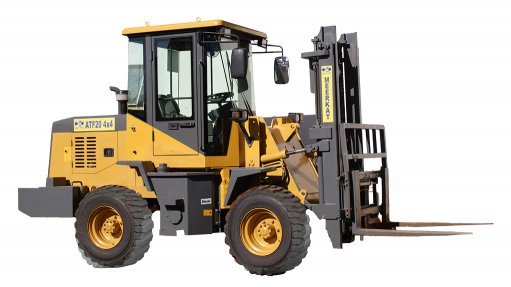
ATF20 MEERKAT The locally manufactured ATF20 Meerkat is an all-terrain forklift, designed for harsh South African conditions
Pretoria-based materials handling equipment company Wuhlf is increasing manufacturing capacity to meet local demand and ease reliance on imported equipment and components, says Wuhlf director Johan Grobler.
Wuhlf manufactures and distributes materials handling equipment, including wheel loaders, forklifts and numerous attachments – many of which are designed specifically for the South African market. The attachments are also designed to be easily and quickly installed onto Wuhlf’s loaders or forklifts, with quick-fit couplers and plug-in hydraulics to assist in fast single-person coupling and decoupling, thereby also extending the versatility of either the loader or forklift.
One such specialised attachment is Wuhlf’s locally designed and manufactured mulcher, which attaches to its ZA20F Buffel wheel loader and is proving popular in the local bush-clearing market, he tells Engineering News. The mulcher can clear various forms of vegetation, from small bush to medium-sized trees using its circular saw.
Grobler says the decision to start manufacturing locally was taken in about June 2014, but has since proven to be a learning curve.
“We have manufactured about four machines to date and are on track for increasing production this year,” he notes, adding that the company plans to be fully ramped up by mid-2016, at which point Wuhlf plans to include about 50% local content in its manufacturing.
“Obviously, once we have reached full production, Wuhlf will gradually surpass 50% local content, with plant refinements and efficiencies being introduced as we streamline our facility.”
The company will continue to source some of the larger and specialised components, such as engines and differentials, from overseas original-equipment manufacturers.
Moreover, Wuhlf has adopted the local manufacturing method of ramping up local production one model at a time. “We have started with the ZA20F Buffel and, once it has reached full production, we will begin with the ATF20 Meerkat forklift and continue in this vein when manufacturing other models,” says Grobler.
The company embarked on the local manufacture of the ATF20 Meerkat during 2013, but, subsequently, outsourced the manufacturing to a Chinese company, as it was cheaper at the time, he notes.
However, owing to the streamlining of its local manufacturing plant, Wuhlf can now resume in-house manufacturing of the forklift and plans to begin production later this month.
Buffel Development
Grobler points out that bush clearing in South Africa is a major problem, especially for the agriculture industry.
He tells Engineering News that an ideal bush-clearing machine requires a specific type of drive system that maintains a constant engine speed, which can provide additional power for hydraulic pumps to power various attachments such as the mulcher.
This constant engine speed is required to drive the mulcher at adequate speeds, while also enabling the vehicle to accelerate and decelerate without losing speed to the mulcher, which might foul or seize up at slow speeds.
To overcome this issue, Grobler says Wuhlf employs a closed-loop hydrostatic drive system that powers all four wheels and also allows for the fitment of hydraulic attachments that are powered by a hydraulic pump.
The ZA20F Buffel is unique in that it uses hydrostatic drives, coupled with an articulated steering mechanism. Usually, hydrostatic drives are used in skid-steer loaders to power the left and right sets of the wheels. However, the skid-steer loaders are difficult to operate because they employ a skidding technique to steer.
“Our machine [the ZA20F Buffel] offers the benefit of hydrostatic drive and an articulated steering mechanism, thereby making it easier to operate,” he says.
Grobler says orders for the ZA20F Buffel with the mulcher are being received faster than Wuhlf can manufacture them, therefore, making the ramp up in production urgent.
Grobler notes that a significant advantage of the depreciating rand against other currencies is that it creates a more competitive environment in South Africa, prompting local consumers to buy locally made products.
Further, local manufacturing also enables Wuhlf to control and enhance the quality of its products through in-house quality control and inspections of finished products.